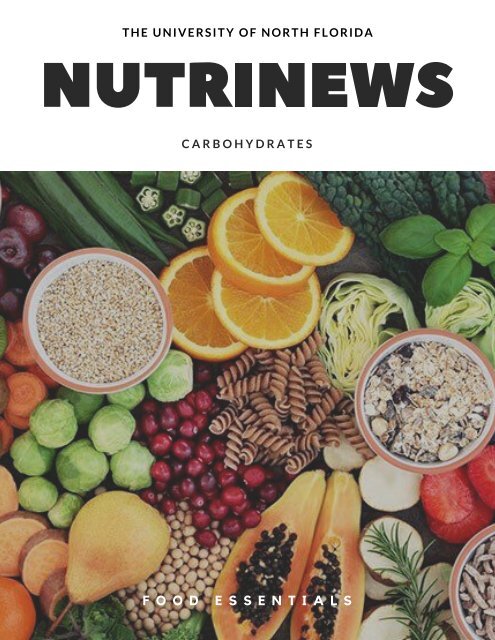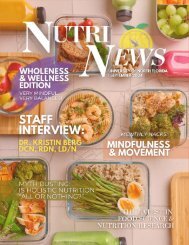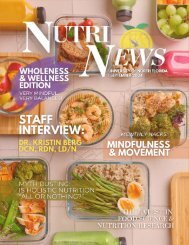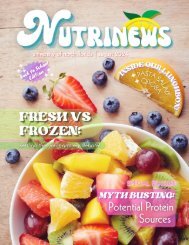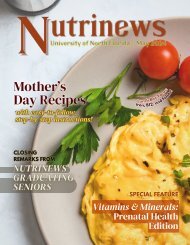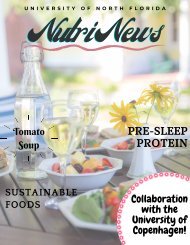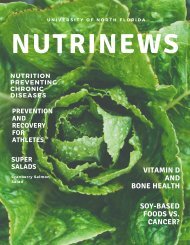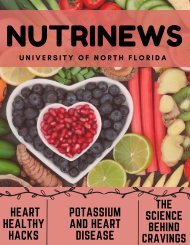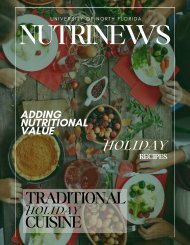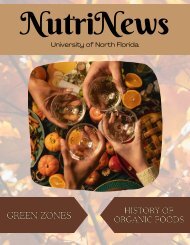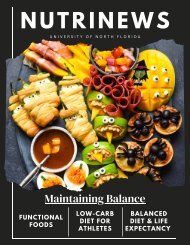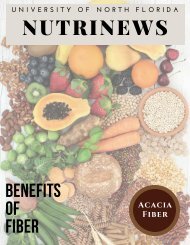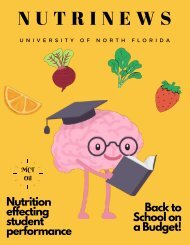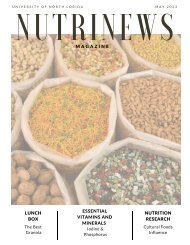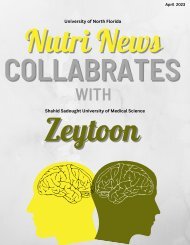December Issue
Hello Ospreys! The theme of the December issue is on Carbohydrates! We also highlight eggplant in our Shopping in Season segment, How to Deal With Diet Culture Around the Holidays, and our Student Spotlight is on Ryan Aranzaso, who is a senior in the nutrition program. Happy reading and good luck with the rest of the semester!
Hello Ospreys!
The theme of the December issue is on Carbohydrates! We also highlight eggplant in our Shopping in Season segment, How to Deal With Diet Culture Around the Holidays, and our Student Spotlight is on Ryan Aranzaso, who is a senior in the nutrition program.
Happy reading and good luck with the rest of the semester!
Create successful ePaper yourself
Turn your PDF publications into a flip-book with our unique Google optimized e-Paper software.
T H E U N I V E R S I T Y O F N O R T H F L O R I D A<br />
C A R B O H Y D R A T E S<br />
NUTRINEWS<br />
F O O D E S S E N T I A L S
Table of Contents<br />
2<br />
COVID CORNER<br />
Staying COVID-conscious<br />
during the holidays.<br />
3<br />
MYTH-BUSTING<br />
Fewer Carbs Fewer<br />
Problems? Maybe Not.<br />
6<br />
DIET CULTURE<br />
How to Deal With Diet<br />
Culture Around the Holidays<br />
8<br />
FOOD SCIENCE<br />
The History of Breadmaking.<br />
11<br />
CLUB UPDATES<br />
Meet Nutrition Journal<br />
Club!<br />
16<br />
STUDENT SPOTLIGHT<br />
An interview with Ryan<br />
Aranzaso<br />
20<br />
FACULTY<br />
SPOTLIGHT<br />
An interview with<br />
Dr. Wright and Dr. Ross<br />
26<br />
NUTRITION<br />
RESEARCH<br />
The Truth About Carbs In<br />
Your Body.<br />
27<br />
THE LUNCH BOX<br />
Recipe: Gingerbread Muffins<br />
with Vanilla Frosting<br />
29<br />
MONTHLY<br />
HACKS<br />
Stay Guilt-Free During<br />
the Holidays<br />
34<br />
NUTRINEWS<br />
STAFF<br />
Meet our staff!<br />
31<br />
SPORTS<br />
NUTRITION<br />
The Effects of<br />
Carbohydrates and<br />
Performance<br />
32<br />
SHOPPING IN<br />
SEASON<br />
This month we are discussing<br />
Eggplants!
COVID-19 CORNER<br />
By: Sofie Van Moorleghem<br />
Happy Holiday Season, Healthy Ospreys!<br />
<strong>December</strong> is upon us, and this means family get-togethers, lots of sweets, and most of all,<br />
traveling. The end of the semester (after finals, of course) usually means we get to relax and just<br />
take it easy through the holiday until the next spring semester. However, this year, just like last,<br />
does include COVID-19. As much as the last year and a half as taken a toll on everyone, the<br />
pandemic is still going on, the Delta variants are spreading, and we all should remain COVIDconscious.<br />
I know that everyone wants to protect their vulnerable family members and no one<br />
wants to spend their vacation in quarantine. So, these are some tips from the CDC to help<br />
everyone stay safe throughout the holiday season1,2:<br />
· Protect those not yet eligible for vaccination, such as young children, by getting yourself and<br />
other eligible people around them vaccinated. Check out the NutriNews September COVID-19<br />
Corner article for vaccination myth-busting!<br />
· Get tested before going to any family gathering, especially if you are showing symptoms of<br />
COVID-19 or if you have had someone close to you have COVID-19.<br />
· Try meeting virtually with immunocompromised family members and friends.<br />
· When inviting guests, keep it small and try to limit it to people who live with you.<br />
· Try holding gatherings outdoors or in a well-ventilated space.<br />
· Whether fully vaccinated or unvaccinated, wear well-fitting masks over your nose and mouth<br />
in crowded, poorly-ventilated indoor areas to reduce transmission in close quarters.<br />
· If you are sick or displaying COVID-19 symptoms, do not host or attend a gathering and get<br />
tested!<br />
When Traveling:<br />
· You must be fully vaccinated to travel internationally.<br />
· CDC recommends delaying travel until you are fully vaccinated.<br />
· Domestically, get tested 1-3 days before your trip.<br />
· Try driving!<br />
· Wear your mask properly over your nose and mouth. The CDC recommends masks even if fully<br />
vaccinated.<br />
· Avoid crowds and stay at least 6 feet apart from others.<br />
· Wash your hands often or use hand sanitizer.<br />
UNF wants all Ospreys to stay safe during the holidays and we look forward to seeing everyone back for<br />
the spring semester! Remember to wear your mask, social distance, and wash your hands, no matter<br />
your vaccination status! Happy Holidays!<br />
References::<br />
1. Scribner H. CDC issues Christmas COVID-19 guidelines, 11 tips for staying safe. Deseret News website. https://www.deseret.com/coronavirus/2021/10/4/22708621/cdc-celebrate-christmas-holidays. Published October 5, 2021.<br />
Accessed October 25, 2021.<br />
2. CDC. Holiday Tips. Centers for Disease Control and Prevention website. https://www.cdc.gov/coronavirus/2019-ncov/daily-life-coping/holidays/celebrations.html. Published October 15, 2021. Accessed October 25, 2021.<br />
2
Fewer Carbs Fewer Problems?<br />
Maybe Not.<br />
B Y : C H L O E M O R G A N<br />
When hearing the words “low-carb diet”<br />
what comes to mind? If you begin to<br />
envision a plate of French fries, the donut<br />
you ate with your coffee this morning, or<br />
the breadsticks your Italian mother-in-law<br />
makes on Sunday nights, you understand<br />
what constitutes carbohydrates with low<br />
nutritional value. However, what you might<br />
not associate with a low-carb diet are the<br />
many nutrient-dense foods that provide<br />
your body with the energy it needs. When<br />
considering a low-carb diet, it is important<br />
to understand the difference between<br />
simple and complex carbohydrates and to<br />
continue to make complex carbohydrates a<br />
balanced part of your diet.<br />
Your body uses carbohydrates as its main<br />
energy source by converting them to<br />
glucose. When you consume<br />
carbohydrates, which are converted into<br />
sugar, your body reacts by producing<br />
insulin.<br />
Insulin plays a role1 in the storage of<br />
glucose in fat cells. It makes sense then,<br />
that when fewer carbohydrates are<br />
consumed, less insulin is produced. When<br />
there is not enough readily consumed<br />
glucose to provide your body with<br />
energy, your body will resort to using<br />
stored fat2 as an energy source. Ketones<br />
are formed when your body resorts to<br />
breaking down stored fat, and when a<br />
high number of ketones are produced3<br />
you will enter ketosis. For people who<br />
want to lose weight quickly, this method<br />
could sound more appealing than<br />
counting calories. However, your longterm<br />
health could suffer.<br />
3
Restricting carbohydrates limits the variety<br />
of food you can consume. Even if you are<br />
consuming more protein and fat to make<br />
up for the reduction in carbohydrates (and<br />
you feel full because of it), your body<br />
requires at least 40% of its calories4 to<br />
come from carbohydrates in order to easily<br />
provide energy for your daily functions. If<br />
this requirement is not being met over<br />
time, your body could resort to breaking<br />
down muscle fibers for energy, which can<br />
lead to weakness and fatigue. Additionally,<br />
your kidneys could suffer the<br />
consequences of too much dependence on<br />
protein, and diets too high in fat<br />
consumption can result in high5<br />
cholesterol levels. It is also important to<br />
note that not all carbohydrates lack<br />
nutritional value. Apples, oranges, berries,<br />
sweet potatoes, squash, peas, black beans,<br />
soybeans, oats, brown rice, and barley are<br />
all examples6 of nutrient-dense, complex<br />
carbohydrates.<br />
Not only do complex carbohydrates<br />
provide your body with the easily<br />
accessible fuel it needs, but they provide<br />
fiber which is essential for digestive health.<br />
Choosing complex carbohydrates over<br />
simple carbohydrates is the best choice<br />
you could make for your overall health. In<br />
doing so, you will receive the vitamins,<br />
minerals, and fiber from a delicious array<br />
of food and will not have to limit yourself<br />
to an entire food group. Choosing to eat<br />
meals balanced with protein, fat, and<br />
carbohydrates will allow you to feel full<br />
and satisfied while providing your body<br />
with appropriate energy. When it becomes<br />
an intentional choice to eat balanced<br />
meals, you might find that you consume<br />
fewer simple carbohydrates without much<br />
effort at all. Instead of restricting your<br />
body and depriving it of the energy it<br />
needs, work on consuming a moderate<br />
amount of complex carbohydrates with<br />
each meal and save the simple<br />
carbohydrates for an occasional treat.<br />
References:<br />
1. National Institutes of Health. NIH study shows how insulin stimulates fat cells to take in glucose findings could aid in understanding diabetes, related conditions. Nih.gov. Published September 7, 2010. Accessed October 28,<br />
2021. https://www.nih.gov/news-events/news-releases/nih-study-shows-how-insulin-stimulates-fat-cells-take-glucose<br />
2. Mayo Clinic. Low-carb diet: Can it help you lose weight? Mayoclinic.org. Published November 18, 2020. Accessed October 28, 2021. https://www.mayoclinic.org/healthy-lifestyle/weight-loss/in-depth/low-carb-diet/art-20045831<br />
3. Pearson, K. What Are the Key Functions of Carbohydrates? Healthline.com. Published November 9, 2017. Accessed October 27, 2021. https://www.healthline.com/nutrition/carbohydrate-functions<br />
4. Oh, R., Gilani, B. and Uppaluri, K. Low Carbohydrate Diet. Statpearls. Updated electronically July 12, 2021. Accessed October 27, 2021. https://www.ncbi.nlm.nih.gov/books/NBK537084/<br />
5. Szalay, J. What are carbohydrates? Livescience.com Published July 14, 2017. Accessed October 27, 2021. https://www.livescience.com/51976-carbohydrates.html<br />
6. Tigar, L. What Happens To Your Body When You Stop Eating Carbs. Eatthis.com. Published October 30, 2020. Accessed October 27, 2021. https://www.eatthis.com/what-happens-body-stop-eating-carbs/<br />
4
Join the world and eat a pear<br />
on <strong>December</strong> 5th<br />
<br />
<br />
World<br />
Pear<br />
Day<br />
<br />
<br />
5
holidays are coming up which means hot<br />
The<br />
cooler weather, seasonal treats, and lots<br />
cocoa,<br />
parties! It also means more time spent with<br />
of<br />
and peers while preparing, cooking,<br />
families<br />
eating food. With that being said, it’s<br />
and<br />
to remember that this time of year<br />
important<br />
be especially triggering to some as diet<br />
can<br />
can really have a way of sneaking up on<br />
culture<br />
Below are some tips to help you navigate<br />
you.<br />
time of year to better enjoy the holidays<br />
this<br />
when diet culture sneaks up on you.<br />
Recognize<br />
the subject.<br />
Change<br />
boundaries with family members.<br />
Set<br />
breaks—simply walk away and remove<br />
Take<br />
from the situation so you can<br />
yourself<br />
decompress.<br />
that food doesn’t have a moral value;<br />
Remember<br />
are no “good” foods and no “bad” foods.<br />
there<br />
that our bodies are meant to change<br />
Remember<br />
are not all meant to look the same.<br />
and<br />
your community with you. Have a buddy<br />
Take<br />
you can reach out to on the phone or<br />
that<br />
you can bring with you for support.<br />
someone<br />
using affirmations before a family gathering,<br />
Try<br />
as: “I’m allowed to eat food that tastes<br />
such<br />
“my body is meant to change”, and “my<br />
good”,<br />
deserves to be nourished”.<br />
body<br />
+ work on your own fatphobia. If<br />
Acknowledge<br />
find yourself passing judgment on the<br />
you<br />
or food choices of someone else: stop<br />
weight<br />
consider what you have just thought and<br />
and<br />
it. Remind yourself that you cannot<br />
challenge<br />
an assumption about someone’s health<br />
make<br />
on how they look or the food choices they<br />
based<br />
How to Deal With<br />
Diet Culture Around<br />
the Holidays<br />
By: Haley Brock<br />
To-do:<br />
and enjoy eating without guilt or shame!<br />
make.<br />
6
don’t want to discuss diets at<br />
“I<br />
dinner.”<br />
Thanksgiving<br />
don’t discuss diets or put<br />
“Please<br />
around food while I am<br />
values<br />
around.”<br />
don’t comment on my body.”<br />
“Please<br />
about my weight/my<br />
“Comments<br />
make me uncomfortable.”<br />
body<br />
nothing wrong with eating<br />
“There’s<br />
that tastes good.”<br />
food<br />
appreciate if you didn’t comment<br />
“I’d<br />
my food choices.”<br />
on<br />
really enjoy talking to you but I<br />
“I<br />
to talk about topics other than<br />
prefer<br />
7<br />
SOME PHRASES<br />
YOU CAN USE:<br />
weight and dieting.”
8<br />
Nutrition Science Research –<br />
The History of Breadmaking<br />
B Y S A M A N T H A D I L L<br />
Bread has been a staple food in the global diet far before<br />
the dawn of MyPlate. The starch has found success in the<br />
Fertile Crescent and has even been referenced biblically1 in<br />
the Book of Genesis when Joseph told the pharaoh to build<br />
warehouses to store grain to prepare for famine. Its<br />
humble origin even extends to its traditional form, as is<br />
thought to be designed after the shape of a brick. Bread<br />
has been the greatest thing since sliced bread since before<br />
there even was sliced bread!<br />
Nonetheless, bread was part of the Spaniard's mission to<br />
colonize Native Americans. The mindset of the colonizers<br />
was that if they ate the same as them, they would be the<br />
same as them. The bread trade2 ravaged Mexico from<br />
1575-1585 so much so that a strictly regulated urban food<br />
supply was developed. These regulations included the type<br />
and origin of flour as well as prices of bread; they couldn't<br />
even sell bread before 7:00 in the morning! Bakers had to<br />
disclose this information to the Fiel Ejecutoria every four<br />
months and those known as fieles respesadores would<br />
inspect the quality and weight of bread. A “gremio” of<br />
workroom owners came into power through a labor trade; a<br />
worker who had loans would come work for them so they<br />
could pay them off (this practice is known as empeño)
Nowadays, bread is mass-produced with<br />
fewer restrictions, and some say a loss of<br />
quality standards has followed. Traditionally,<br />
bread is formed from a gluten3 network, and<br />
carbon dioxide is trapped from yeast<br />
fermentation once flour, water, and yeast are<br />
mixed. As time has passed and technology<br />
has progressed, preservatives and additives<br />
are commonly found in store-bought bread.<br />
In America, consumer shopping patterns<br />
have changed. Customers expect bread to<br />
remain “spoilage free” yet affordable, as<br />
frequent trips to bakeries are not the norm<br />
(or accessible to all) in the states and the<br />
average cost4 of a loaf is $2.50. To some,<br />
American sliced loaf bread is so inauthentic<br />
that it is not even considered bread!<br />
Additional “threats” to the authenticity of<br />
bread include the growing gluten-free<br />
dietary movement. As awareness of celiac<br />
disease and non-celiac gluten sensitivity<br />
(NCGS) have grown within the country, the<br />
definition of bread has expanded.<br />
Though the definition of bread varies from<br />
country to country, it is doubtful that its<br />
popularity will fade any time soon. It is still a<br />
necessity in the diet and brings people<br />
around the globe together in the kitchen at<br />
the dinner table. Whether it is naan, challah,<br />
brioche, focaccia, rye, or multigrain,<br />
fermentation brings together the nations!<br />
References:<br />
1. Matvejevic P. Levantine Legends and Histories of Bread. The Massachusetts review. 2014;55(4):547-553.<br />
2. Weis R. Bakers and Basques: A Social History of Bread in Mexico. University of New Mexico Press; 2012.<br />
3. Cauvain SP. Breadmaking : Improving Quality . CRC Press; 2003.<br />
4. Cost of Living in the United States. Studying-in-us.org. Accessed October 23, 2021. https://studying-in-us.org/cost-of-living-in-the-unitedstates/#:~:text=A%20gallon%20of%20milk%20costs,are%20about%20%242.00%20per%20dozen.<br />
<br />
9
10<br />
HUMAN<br />
RIGHTS<br />
DAY<br />
<strong>December</strong> 10th
11<br />
U N F C L U B U P D A T E :<br />
N J C<br />
B Y : L A U R A R O G E R S<br />
This month we are proud to feature UNF's Nutrition Journal Club (NJC).<br />
Starting in 2014, this group is aimed at allowing students to dive deep into<br />
nutrition-related research in a relaxed, fun environment among their peers.<br />
Without the requirement of extensive research skills, monthly meetings are<br />
comprised of a general topic featured in relevant articles. The articles are<br />
broken up into sections, including introduction, methods, results, and<br />
conclusion/discussion. Some highlighted topics allow for videos, guest<br />
speakers, and other related materials or persons.
Until further notice, all NJC monthly meetings will be<br />
held on Zoom every 1st Wednesday at 10 am<br />
Make sure to follow NJC on Instagram @unf_njc<br />
For any questions, email <br />
nutritionjournalclubunf@gmail.com<br />
14
15
16<br />
STUDENT SPOTLIGHT:<br />
RYAN ARANZASO<br />
A mistle-toast to the holiday season, the<br />
most pun-derful time of the year! Let’s give<br />
a big round of santa-plause for our<br />
<strong>December</strong> Student in the Spotlight, Ryan<br />
Aranzaso! Ryan was born in Guam and<br />
moved here to Jacksonville in 2004. He is a<br />
Senior in the Dietetics Program who<br />
currently works as a Medical Assistant and<br />
a scribe at an orthopedic clinic. Some of his<br />
job responsibilities include detailed<br />
documentation of patient clinic visits and<br />
ordering labs, imaging, and medications<br />
suggested by the MD (what a busy elf!). As<br />
if that wasn’t interesting enough, Ryan has<br />
eight years of experience playing the<br />
trumpet, and he even made the top band<br />
in Clay County for six consecutive years! He<br />
was also awarded the John Phillips Sousa<br />
Award in 2018 for his excellence in music<br />
performance. Stick around to learn more<br />
about this extremely ambitious student, or<br />
yule be sorry!<br />
B Y : C A R O L R I G G I N S<br />
CR: What inspired you to pursue a degree in<br />
Nutrition and Dietetics?<br />
RA: I have always been a very small child<br />
growing up, both weight and height-wise.<br />
This led to me having a lot of health issues<br />
related to inadequate intake. As I grew up, it<br />
was not until my last year of high school<br />
where I started eating more and watching<br />
what types of food I consumed. I also started<br />
going to the gym at this point, and the<br />
progress that I was seeing was very<br />
motivating to me. I was also feeling so much<br />
better about myself mentally and physically.<br />
I always knew I wanted to work in<br />
healthcare and since nutrition had made the<br />
biggest impact in my life, I decided to major<br />
in it.
17<br />
CR: What class or experience have you<br />
found most difficult during your time in the<br />
Dietetic program, and why?<br />
RA: The hardest class that I experienced in<br />
this program has got to be Microbiology. The<br />
complexity of the topics and the amount of<br />
memorization that was needed to barely<br />
pass the class was immaculate. The lab was<br />
very hands-on and the critical thinking skills<br />
that went into the lab exams were very<br />
stressful for me. I am very fortunate to pass<br />
with a B in that class.<br />
CR: What has been the highlight of your<br />
experience as a Dietetics student?<br />
RA: The highlight of my experience as a<br />
Dietetics student has easily got to be the<br />
Food Fundamental Lab that I took in the fall<br />
semester of my junior year with Professor<br />
Baron. That class was all about cooking and<br />
the science behind it, and it was so fun to<br />
cook alongside my classmates who held the<br />
same happy joyful energy that I brought to<br />
the lab every week. In that class I<br />
experienced a lot of new cooking techniques<br />
I would never use at home and tasting all<br />
the different foods was a different and nice<br />
experience. I genuinely miss that class<br />
because of how hands-on it was and the<br />
perfect balance between work and fun that<br />
it had.<br />
CR: What ambitions do you plan to pursue<br />
upon graduation?<br />
RA: I am pursuing to go to PA school after<br />
graduating. As I progressed through my<br />
program, I found that my aspirations were in<br />
a different direction. I still have a fond love<br />
for nutrition and dietetics, but since I<br />
started working at the orthopedic clinic, I<br />
quickly fell in love with the idea of being a<br />
PA. I love the versatility that the position<br />
brings and the care that comes with it too.<br />
My main goal is to become a PA in<br />
coordination with being an officer in the<br />
Navy, so I can follow in the footsteps of my<br />
dad.<br />
CR: Is there any advice that you would offer<br />
to incoming dietetics students here at UNF?<br />
RA: The advice that I would offer to<br />
incoming dietetics students is to not be<br />
afraid to talk to your professors. Professors<br />
love to help in any way, shape, or form, and<br />
doing so will also build a good relationship<br />
between you and your professor which<br />
could help you later down the road in terms<br />
of letters of recommendation and whatnot.<br />
Also, be mindful that it is OKAY to struggle,<br />
success is derived from people who<br />
persevere through adversity and hardship.
18<br />
CR: How do you enjoy spending your<br />
free time (if any) when you’re away<br />
from school?<br />
RA: One of the things I like doing in my<br />
free time while I am away from school is<br />
working out. I love the idea of selfimprovement,<br />
and it is always<br />
encouraging to see progress within<br />
myself even if it is minuscule. Another<br />
thing I like to do is to practice reading<br />
and examining MRI or x-rays spines with<br />
symptomatology, so I can get better at it<br />
and prepare myself for the future.<br />
CR: Are there any traditional meals or<br />
snacks that you enjoy making during<br />
the holiday season?<br />
RA: One traditional snack I love eating<br />
and making during the holiday season—<br />
specifically Christmas—is peppermint<br />
bark. The process is simple, melt milk<br />
chocolate onto a baking sheet, melt<br />
white chocolate on top, and then add<br />
the crushed candy canes and chill and<br />
you have the best snack Christmas has<br />
to offer.<br />
CR: Do you have any motivational<br />
quotes or mantras that you live by that<br />
you would like to share with us?<br />
RA: One motivational quote that I try to<br />
live by is “no one will believe in you if<br />
you don’t believe in yourself.” This quote<br />
genuinely speaks to me because<br />
growing up I always had issues when it<br />
came to performing, test-taking, or<br />
anything. I was consistently doubting<br />
myself which severely affected my<br />
performance due to overthinking and<br />
worrying too much if I failed. Always<br />
keep in mind, it is okay to fail, but it is<br />
not okay to give up.
19<br />
N A T I O N A L<br />
T E A D A Y<br />
RAISE AWARENESS<br />
IMPORTANCE OF TEA TRADE<br />
D E C E M B E R 1 5 , 2 0 2 1<br />
START YOUR DAY WITH A CUP OF TEA
20<br />
PART 2:<br />
FACULTY SPOTLIGHT<br />
A N I N T E R V I E W W I T H D R . R O S S A N D D R . W R I G H T<br />
<br />
<br />
B Y : A N N A W A T E R M A N<br />
Dr. Ross<br />
Dr. Wright<br />
Question 1: If there was one thing that you would want every nutrition student to have<br />
learned while in this program, what would it be?<br />
Dr. RossTailoring to the individual while pushing the boundaries of what people may think<br />
the field of dietetics is limited to. Not staying in this pre-determined box of what people<br />
think that we do.<br />
Dr. Wright: “The Ensure pushers of the world, the dietitians that don’t think outside of the<br />
box. They don’t treat the person as an individual. Don’t have an appetite, here have an<br />
Ensure, really don’t have an appetite? Have two. That’s not going to work.”<br />
Within the academy, they are pushing the limits for standards for accreditation. They are<br />
talking about placing tubes for feedings, dosing insulin, swallow studies, blood pressure.<br />
While we may not quite be there yet, “it is sending a message that we need to expand our<br />
scope.”<br />
Dr. Ross: "These standards are definitely creating a much-needed conversation because you<br />
can’t, in one breath, talk about the decline of applicants and lack of respect for the<br />
profession and then also say oh we can’t do that, we can’t do that. The truth probably lies<br />
somewhere in the middle, but we have to start with that boundary and then see where we<br />
can push it. We’re hopeful that this will advance our profession.”
21<br />
Question 1 Continued: If there was one thing that you would want every nutrition<br />
student to have learned while in this program, what would it be?<br />
Dr. Wright: “If you want to change the profession, you have to change the education.” Once<br />
people are practitioners, many of them don’t care to learn something new. You have to<br />
require it for all new graduates so once they enter the field, they already have learned the<br />
new standards and are ready to apply them.<br />
Dr. Ross: While the field may be evolving, students still need to know about preexisting<br />
methods of practice. For example, students still need to know how to complete a SOAP<br />
note. It’s important to know what is currently happening in the field so the curriculum can<br />
prepare students for it.<br />
Dr. Wright: Dietitians not wanting to touch people. EMR has been a great advancement in<br />
technology, but there are some people that use it as an excuse not to see the patient. They<br />
base everything off on what is written instead of actually going and talking to the patient.<br />
Some dietitians out there don’t even see their patients.<br />
Question 2: What’s one piece of advice you would give anyone looking to pursue a degree<br />
in nutrition and/or become a registered dietitian?<br />
Dr. Wright: I have a recipe for getting an internship:<br />
Keep your GPA up<br />
Dietetic students cannot mess around<br />
Get the right volunteer work<br />
Dietetics-related work experience.<br />
Diet clerk at a nursing home or a hospital<br />
Diet tech<br />
“People may think that doing a lot of volunteer work is enough, but you really need all three<br />
ingredients because our training is really hard, but it’s the best field in the world. So, it’s<br />
worth it!”<br />
Dr. Ross: What Dr. Wright said, “is exactly what I tell prospective students, in that order.” I<br />
stress volunteer work as being meaningful. Can you get some leadership and commitment<br />
with that volunteer work? Maybe you can’t work 20 hours a week at a job, What can you<br />
carve out for yourself in other areas beyond one or two volunteer days sporadically? Can you<br />
do something dedicated to overtime?<br />
Dr. Wright: “And you want letters of recommendation from a dietitian if possible.”
22<br />
PART 2<br />
Question 2 Continued: What’s one piece of advice you would give anyone looking to<br />
pursue a degree in nutrition and/or become a registered dietitian?<br />
Dr. Ross: I would add that [letters of recommendation] to the recipe for getting an<br />
internship. You can get those from your volunteer and work experience. But also<br />
understanding that the two years in your undergraduate coursework is like an interview.<br />
The entire time, think of it as an interview. Conduct yourself professionally, be approachable,<br />
take advantage of [your professors’] office hours to get to know them. When it comes time<br />
to write recommendation letters if all I know about you is that you did well in my class,<br />
what else am I going to write?<br />
Dr. Wright: [but if you have made the effort to get to know us] We can say that not only did<br />
[they] do great in my class, but I know them from volunteering, etc. We are able to make it<br />
personal because we know you and speak about your character and other aspects of who<br />
you are.<br />
Question 3: What changes in the realm of dietetics do you perceive happening in the<br />
future?<br />
Dr. Wright: "There is a big emphasis in the academy, as there is in the whole country, for<br />
diversity inclusion.”<br />
Dr. Ross: “A much-needed push.”<br />
Question 4: How do you feel UNF is achieving diversity inclusion and how could we<br />
improve in that area?<br />
Dr. Wright: We partner with sites to place our students to work with diverse populations<br />
and learn about diverse cultures. We also partner with organizations that are part of the<br />
movement to diversify dietetics and work only with underserved populations.<br />
UNF has a lot of scholarship opportunities. And the nutrition department works to give all<br />
students opportunities for internships. If they can’t work or can’t afford a certain internship,<br />
we work with them to give them opportunities and make connections so they can go on.<br />
“Affording an internship can be a huge roadblock for some students so we try to get them<br />
connected to scholarships and to opportunities to build up their resume or ‘recipe’ to get<br />
into an internship. [It] goes back to the individualization of our students.”
23<br />
PART 2<br />
Question 4 Continued: How do you feel UNF is achieving diversity inclusion and how could<br />
we improve in that area?<br />
Dr. Ross: “Awareness of the field as well. Can we go out to high schools and reach students<br />
who may not know about the field of nutrition? [Working on] building that bridge.”<br />
Two years ago, I worked with the EXPLORE program at the Brooks College of Health. We<br />
partnered with a couple of agencies in Jacksonville that serve underserved high school<br />
students interested in healthcare careers. We brought them here to campus with the focus<br />
on all the programs [in Brooks College of Health] with nutrition being one of them. Since<br />
then, it has grown so other units on campus are looking into similar programs. UNF as a<br />
whole really values diversity and has taken action to show that.<br />
Dr. Wright: In the Academy, we are having a lot of conversations about diversity. The year<br />
that I was speaker of the house, the whole program of work was dedicated to diversity as an<br />
organization. It’s not only about diversity in ethnic groups; it’s diversity in areas of practice.<br />
There is some negativity toward dietitians who work in industry, that work for McDonald's<br />
for example. “There are [also] issues about weight bias amongst dietitians.”<br />
Dr. Ross: "That [weight bias] is the strongest. Research has shown that over and over again.”<br />
Dr. Wright: "Traditionally, there is a lot of discrimination against the “non-traditional”<br />
student. [Those in the field of dietetics] don’t even want to talk to you if you’re not the 18–<br />
20-year-old with no family. Traditional students were seen more favorably because they<br />
“wouldn’t give any lip, they wouldn’t have to call off because of a sick kid.” But that is not the<br />
case at UNF, There are so many “postbacks” and we love that in the nutrition program. So,<br />
it’s not just about ethnic diversity. The type of student, those who already hold degrees, who<br />
have families, broaden the definition of diversity."<br />
Editor’s Notes: These two women are not only brilliant and incredibly hard workers, but<br />
they also care deeply about the nutrition programs and the students at UNF. If you are a<br />
current or prospective student who are thinking about becoming a registered dietician,<br />
these are the ladies you want in your corner! If you have questions about the nutrition and<br />
dietetics programs at UNF, you can contact them with the information provided below"
24
25
Muffins<br />
Gingerbread<br />
Vanilla Frosting<br />
with<br />
Paige Courtier<br />
By:<br />
12 muffins<br />
Yield:<br />
Ingredients<br />
½ cup unsalted butter, melted<br />
▫<br />
¾ cup dark molasses<br />
▫<br />
2 2/3 cups all-purpose flour<br />
▫<br />
1 ½ tsp baking soda<br />
▫<br />
¼ tsp salt (omit if butter is salted)<br />
▫<br />
1 ½ tsp ground cinnamon<br />
▫<br />
1 ¼ tsp ground ginger<br />
▫<br />
½ tsp ground cloves<br />
▫<br />
½ cup packed light or dark brown sugar<br />
▫<br />
1 large egg, room temperature<br />
▫<br />
½ cup plain yogurt (regular or Greek,<br />
▫<br />
full fat)<br />
preferably<br />
½ cup milk of choice<br />
▫<br />
optional: coarse sugar for sprinkling<br />
▫<br />
Vanilla frosting (I used Simple Mills)<br />
▫<br />
Directions<br />
the oven to 425°F.<br />
1.Preheat<br />
the butter in the microwave along with<br />
2.Soften<br />
molasses and set aside to cool. Warming<br />
the<br />
molasses helps to thin it out, allowing it to<br />
the<br />
more easily.<br />
combine<br />
a large mixing bowl, combine flour, baking<br />
3.In<br />
cloves, cinnamon, ginger, and salt (if<br />
soda,<br />
is unsalted).<br />
butter<br />
a separate bowl, whisk the egg.<br />
4.In<br />
together the egg, brown sugar, yogurt,<br />
5.Whisk<br />
and butter/molasses mixture.<br />
milk,<br />
the wet ingredients from the medium<br />
6.Pour<br />
into the dry ingredient in the large bowl;<br />
bowl<br />
thoroughly without over-mixing.<br />
combine<br />
a muffin tin with muffin liners.<br />
7.Line<br />
tin with batter all the way.<br />
8.Fill<br />
with sugar if desired (adds a good<br />
9.Sprinkle<br />
crunch).<br />
Bake at 425°F for 5 minutes, then, reduce to<br />
10.<br />
(keeping the muffins in the oven) and<br />
350°F<br />
baking for 16-17 minutes.<br />
continue<br />
Remove the muffins from the oven and allow<br />
11.<br />
to cool for 15-20 minutes.<br />
them<br />
adapted from: Gingerbread Muffins with Lemon Glaze. Sally's Baking Addiction website.<br />
Recipe<br />
Accessed<br />
https://sallysbakingaddiction.com/gingerbread-muffins-with-sweet-lemon-glaze/.<br />
27<br />
LUNCH BOX<br />
12. Frost and serve!<br />
November 3, 2021.
30<br />
cope with the stressors of life. It could look<br />
fight-or-flight response.1 When this happens,<br />
blood sugar levels rise, among other<br />
like taking breaks from schoolwork and<br />
projects to regroup and relax your mind,<br />
physiological processes that our bodies<br />
influence to keep us alive. This high-stress<br />
practicing joyful movement, getting some<br />
sunshine, or enjoying time spent with friends<br />
state can impact both our minds and bodies,<br />
leaving us more preoccupied with food and<br />
or family. During this holiday season, it<br />
might be fun to tackle a baking project,<br />
even more distressed. On the other hand,<br />
studies have also shown that cultivating<br />
attend community holiday activities, or take<br />
time to watch your favorite movie.<br />
strong connections with those around you can<br />
result in lower blood pressure and decreased<br />
Understanding how you can cope with stress<br />
can make the holiday season more<br />
mortality.2 Additionally, even when<br />
individuals had other risk factors (like smoking<br />
enjoyable. If you are interested in looking<br />
more into self-help resources that UNF<br />
and physical inactivity), but embraced social<br />
connections, they tend to live longer than<br />
offers, visit:<br />
those who had more health-promoting habits<br />
but lacked social connections. This tells us<br />
https://www.unf.edu/counselingcenter/Self_Help.aspx.<br />
The best thing you can do this holiday<br />
that instead of focusing on restricting or<br />
season is focus on your social connections,<br />
indulging due to the holiday season, embrace<br />
the holidays and the people around you while<br />
practice stress management, and engage in<br />
activities that bring you joy. Do not<br />
enjoying your traditional meals and activities.<br />
If you need help navigating food and<br />
underestimate the power of reaching out for<br />
help if you need it. Happy Holidays!<br />
nutrition, UNF offers free nutrition counseling<br />
and services for students, faculty, and staff,<br />
visit:https://www.unf.edu/recwell/wellness/n<br />
utritionservices/<br />
Prioritize self-care. When life gets stressful—<br />
holiday season or not—it is useful to have a<br />
REFERENCES:<br />
1.HERHAUS B, ULLMANN E, CHROUSOS G, PETROWSKI K. HIGH/LOW<br />
self-care toolbox to pull from whenever you<br />
CORTISOL REACTIVITY AND FOOD INTAKE IN PEOPLE WITH OBESITY AND<br />
need to center yourself. Self-care is all about<br />
HEALTHY WEIGHT. TRANSL PSYCHIATRY. 2020;10(1):40.<br />
HTTPS://DOI.ORG/10.1038/S41398-020-0729-6<br />
acknowledging where you are, meeting your<br />
2.MARTINO J, PEGG J, FRATES EP. THE CONNECTION PRESCRIPTION:<br />
USING THE POWER OF SOCIAL INTERACTIONS AND THE DEEP DESIRE<br />
current needs, and reaching out for support<br />
FOR CONNECTEDNESS TO EMPOWER HEALTH AND WELLNESS. AM J<br />
LIFESTYLE MED. 2015;11(6):466-475.<br />
when you need it.3 Practicing self-care will<br />
HTTPS://DOI.ORG/10.1177/1559827615608788<br />
3.GODFREY CM, HARRISON MB, LYSAGHT R, LAMB M, GRAHAM ID,<br />
look different for everyone, but the goal is to<br />
OAKLEY P. THE EXPERIENCE OF SELF-CARE: A SYSTEMATIC REVIEW. JBI<br />
LIBR SYST REV. 2010;8(34):1351-1460. DOI:10.11124/01938924-<br />
positively impact your mind and body to help<br />
201008340-00001
The Effects of<br />
Carbohydrates on<br />
Performance<br />
<br />
By: Brianna Brand<br />
If you are an athlete or someone who<br />
wants to improve their physical<br />
performance, you may have been to your<br />
local supplement store looking for<br />
something to give you an extra boost.<br />
Unfortunately, and contrary to popular<br />
belief, the best ergogenic aid on the<br />
market is not found at these kinds of<br />
places and is demonized on the internet.<br />
I know what you're probably thinking, and you're wrong; it's carbohydrates!<br />
Select carbohydrate foods are rich in vitamins, minerals, and<br />
fiber; carbohydrates are also the body's preferred fuel source.<br />
In terms of energy production, carbohydrates produce 17%<br />
more adenosine triphosphate (ATP) when oxidized compared<br />
to fatty acid molecules.1 There are two pathways in which the<br />
human body produces energy: aerobic and anaerobic. The<br />
aerobic pathway provides energy for long-duration activities,<br />
such as walking, long-distance swimming, or running.1 The<br />
anaerobic pathway provides rapid energy for intense bursts of<br />
energy, including weightlifting, stop-and-go sports, and<br />
sprinting.2 As intensity increases, so does the reliance on<br />
carbohydrates, because stored carbohydrates in the form of<br />
glycogen are the most readily available and convert to usable<br />
energy more quickly than fat stores.1 The readily available<br />
energy known as blood glucose runs out quickly during<br />
exercise; stored glucose in the form of glycogen is released to<br />
replenish the energy supply in the blood and prevent<br />
hypoglycemia.1 Glycogen is primarily stored in the liver and<br />
muscle tissues which can store on average 12g of glycogen per<br />
kilogram of muscle mass; this can calorically add up to a full<br />
day of meals.1 In studies comparing performance between<br />
high/moderate carbohydrate intake to low carbohydrate intake<br />
where the energy needs are matched, depleted glycogen<br />
stores correlate with reduced training intensity, fatigue, and<br />
concentration, which could potentially hinder performance<br />
improvements.2 f you are eating a well-balanced, moderate to<br />
high carbohydrate diet, it may not be necessary to eat before<br />
exercising if you are training for less than 30 minutes or<br />
resistance training for up to 2 hours.1<br />
If exercise is performed at moderate to high intensities for over 30<br />
minutes, the rule of thumb is to take in at least 25-30g of<br />
carbohydrates pre-workout.1 Under these same conditions,<br />
depending on intensity and length of time, the athlete may benefit<br />
from intra-workout carbohydrate intake through gels or sports<br />
drinks with the aim of 30-80g of carbs per hour of exercise.1<br />
Studies have found that supplementation of carbohydrate-filled<br />
electrolyte drinks while exercising can further the amount of time<br />
an athlete could train for, increasing the time it took to fatigue by<br />
37%.3 Ingesting carbohydrates during exercise provides energy<br />
when glycogen stores become depleted and can be used as an<br />
energy source within 10 minutes of intake.1 Results from two<br />
other studies found that athletes drinking electrolyte/carbohydrate<br />
drinks improved their running time by 33% and 32% compared to<br />
the placebo groups.3 After training, the general rule of thumb is to<br />
intake 60-80g carbs an hour for 3-4 hours to fully replete glycogen<br />
stores and repair muscle damage.1 When competition arrives,<br />
endurance athletes or those competing in longer competitions may<br />
benefit from carbohydrate loading up until the competition.1<br />
Currently, the recommendation is to consume moderate<br />
carbohydrates up until three days prior to the competition, when<br />
the athlete will shift to a high-carbohydrate diet.1 The act of<br />
carbohydrate loading can increase glycogen storing capabilities by<br />
double, which can potentially improve performance.1<br />
Carbohydrate loading may especially be beneficial to thosep<br />
lanning to sweat during their competition because with increased<br />
glycogen stores comes increased water in the muscle, which can<br />
counterbalance the fluid loss from sweating.1<br />
References:<br />
1. Rawson ES, Branch JD, Stephenson t. Nutrition for Health, Fitness and Sport. McGraw-Hill Higher Education. 2016. https://ebookcentral.proquest.com/lib/[SITE_ID]/detail.action?docID=5662681.<br />
2. Kanter M. High-Quality Carbohydrates and Physical Performance: Expert Panel Report. Nutrition today (Annapolis). 2018;53(1):35-39. doi:10.1097/NT.0000000000000238.<br />
31<br />
3. Williams C, Rollo I. Carbohydrate Nutrition and Team Sport Performance. Sports Med. 2015;45(Suppl 1):13-22. doi:10.1007/s40279-015-0399-3.
½ tsp chili powder<br />
Eggplant Curry<br />
INGREDIENTS<br />
PROCEDURES<br />
1lb eggplant<br />
¼ tsp turmeric powder<br />
Roast Eggplants<br />
Quarter lengthwise, then horizontally making 2-3inch<br />
1tsp kosher salt<br />
pieces<br />
Toss in a mixture of 1tsp kosher salt and ¼ tsp turmeric<br />
2 tbsp vegetable oil<br />
¼ tsp turmeric powder<br />
powder<br />
Heat 2tbsp oil in a large skillet, cook eggplant in batches to<br />
avoid overcrowding<br />
2 tsp cumin<br />
Set aside when fully roasted: dark brown with wilted skin<br />
1 tbsp coriander<br />
Make Curry Sauce<br />
Kosher salt to taste<br />
In the same pan, heat the remaining oil. Add mustard seeds<br />
allowing to crackle<br />
CURRY SAUCE<br />
Add and sauté onions until transparent<br />
Add Serrano peppers, ginger, garlic, and curry leaves. Stir<br />
1tbsp vegetable oil<br />
constantly for 1minute<br />
1tsp brown mustard seeds<br />
Add tomatoes, cook 4-5 minutes<br />
1 onion, thinly sliced<br />
½ C tomato pulp/Passata (tomato puree of<br />
Add remaining spices<br />
Pour in ½ C water, let it come to a rapid boil<br />
blanched, skinless tomatoes)<br />
Add roasted eggplant to the sauce<br />
1 Serrano pepper<br />
Partially cover and simmer 20-30minutes. Add water if it<br />
1 tbsp ginger, mined<br />
becomes too thick<br />
Pour thick full-fat coconut milk and stir well, cook 1 minute<br />
1 tbsp garlic, minced<br />
Serve hot with rice or flatbread<br />
1 sprig curry leaves (found at local Indian<br />
grocers in Jax)<br />
1C water<br />
¼ C coconut milk, thick full cream<br />
1. Taher D, Solberg SO, Prohens J, et al. World vegetable center eggplant collection: origin, composition, seed dissemination and utilization in breeding. Plant Sci. 2017. https://doi.org/10.3389/fpls.2017.01484<br />
2. Eggplant. UF IFAS Gardening Solutions. https://gardeningsolutions.ifas.ufl.edu/plants/edibles/vegetables/eggplant.html Accessed November 15, 2021<br />
3. Eggplant production in Miami-Dade County, Florida. Ask IFAS. https://edis.ifas.ufl.edu/publication/tr008 Accessed November 15, 2021<br />
4. Eggplant, cooked, boiled, drained, without salt. U.S. Department of Agriculture. https://fdc.nal.usda.gov/fdc-app.html#/food-details/169229/nutrients Published April 1, 2019. Accessed November 15, 2021<br />
5. Rajesh J. South Indian eggplant curry. Curry Trail, Simple Flavorful Recipes for the Home Cook. https://www.currytrail.in/indian-eggplant-curry/ Published August 23, 2021. Updated August 27, 2021. Accessed November 15,<br />
2021.<br />
33
Meet The Staff<br />
Anna Waterman<br />
Editor in Chief<br />
Laura Rogers<br />
Co-Editor in Chief<br />
Melissa Brennan, M.S.<br />
Head Writer<br />
Follow us!<br />
@unfnutrinews<br />
34
Meet The Staff<br />
Anna McQueen<br />
Head Publisher<br />
Jessica Pires<br />
Public Relations Media Manager<br />
Dr. Alireza Jahan-Mihan<br />
Faculty Advisor<br />
Our website:<br />
https://unfnutrinews.wordpress.com/<br />
35
Meet The Staff<br />
Maritza Ou<br />
Public Relations Website Manager<br />
Alexandra Threlkeld<br />
Secretary<br />
Atalia Vazquez<br />
Treasurer<br />
Contact Us:<br />
UNFNutriNews@gmail.com 36
Meet The Staff<br />
Larissa DePasqua<br />
Editor<br />
Dalila Mumic<br />
Editor<br />
Janine DAmico<br />
Editor<br />
Follow us!<br />
@unfnutrinews<br />
37
Meet The Staff<br />
Shantih Coro<br />
Photographer<br />
Priscilla Stevens<br />
Flyer Creator<br />
Saily Medero<br />
Publisher<br />
Rayonna Hills<br />
Publisher<br />
Our website:<br />
https://unfnutrinews.wordpress.com/<br />
38


